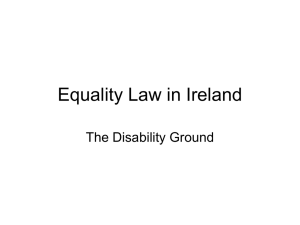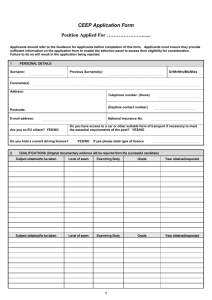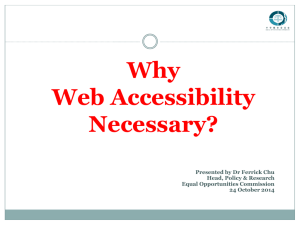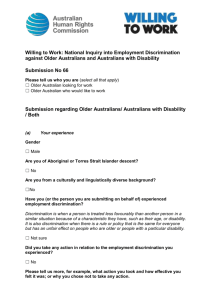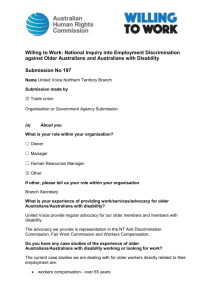Submission No 114 - Australian Human Rights Commission
advertisement
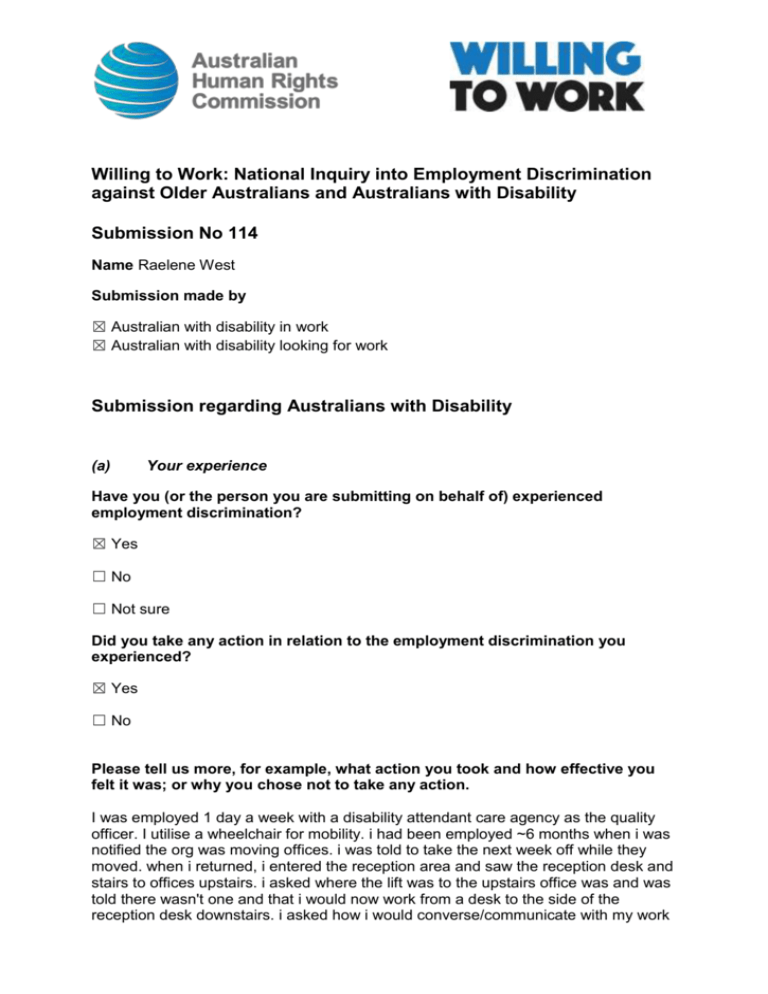
Willing to Work: National Inquiry into Employment Discrimination against Older Australians and Australians with Disability Submission No 114 Name Raelene West Submission made by ☒ Australian with disability in work ☒ Australian with disability looking for work Submission regarding Australians with Disability (a) Your experience Have you (or the person you are submitting on behalf of) experienced employment discrimination? ☒ Yes ☐ No ☐ Not sure Did you take any action in relation to the employment discrimination you experienced? ☒ Yes ☐ No Please tell us more, for example, what action you took and how effective you felt it was; or why you chose not to take any action. I was employed 1 day a week with a disability attendant care agency as the quality officer. I utilise a wheelchair for mobility. i had been employed ~6 months when i was notified the org was moving offices. i was told to take the next week off while they moved. when i returned, i entered the reception area and saw the reception desk and stairs to offices upstairs. i asked where the lift was to the upstairs office was and was told there wasn't one and that i would now work from a desk to the side of the reception desk downstairs. i asked how i would converse/communicate with my work colleagues and was told i should ring or email them to arrange a meeting in a downstairs meeting room. i thought this was blatantly discriminatory and was unhappy with the situation. i emailed management to communicate that i thought it was discriminatory and was unhappy with the situation, particularly given they were in the disability industry. they responded that it was an oversight and also that i could keep the reception girl company. i submitted a discrimination claim to VEOHRC. After meeting VEOHRC to detail the claim, the org was sent a letter to join conciliation about the situation. the org refused to be a part of any conciliation. Did your experience of employment discrimination impact on your participation in the workforce? (For example, did you have to stop work, change jobs or take sick leave?) ☒Yes ☐No Please tell us more unhappy with the situation and given the org had refused to be a part of any conciliation, and no clear resolution was available (other than installing expensive lift) i resigned and withdrew the VEOHRC claim. given I was employed 1 day a week, it was not worth stress. i was disappointed with ethics of org. if i had been employed full time, i would have pursued VEOHRC claim re situation (b) Barriers Do you think older Australians/Australians with disability face barriers when they look for work or are in a job? ☒Yes ☐No ☐Not sure If yes, or not sure, what do you think these barriers might be? Barriers identified: Employer attitudes to hiring pwd Physical access to workplace lack of organisational training and awareness in workplace lack of Govt incentives to encourage employment i.e. TAC return to work program is positive Pool of jobs available is reduced - can’t stack shelves or make coffees; and that is just physical barriers not attitudinal 2 Disclosure of disability in interview process - reasons for and reasons against SBS Insight episode ‘Jobs and Disability’ aired 19 Aug 2014 http://www.sbs.com.au/news/insight/tvepisode/jobs-and-disability Employer attitude - I wonder if they are capable of undertaking the work role; would try to objectively compare them to other applicants; then if suitable; right person for job; sense of ‘are they going to be more work for me?’ or ‘is that going to make it harder for me > employee them; ...you have to think of other employees as well - it is a total equation of things you have to ad up; regardless of if person has disability, employer recruits on culture - will person fit into culture; will disability hinder pwd in completing their work role? If pwd doesn’t disclose and employer finds out about a condition, trust and honesty is questioned, employer thinking there is dishonesty, employer has expectation of capacity; 1 employer would prefer honesty and clarity Legally under DDA act there is no obligation to disclose, but if you don’t disclose disability to employer, they then can’t make any reasonable adjustments; opinion - if adjustments are going to be needed above the norm, probably a good idea to disclose; pwd fear reaction of employer however probably preferable that both parties know where they stand Another employer attitude - trying to run a business, be successful and be competitive - doesn’t have time to be bogged down with 1 person they don’t know how to help Challenges for employers - attitude of other employees and managers; stereotypes of incapacity; managers worried about having to put in extra effort to teach, train, develop them>is this a real issue?? Possibly it is, usually at startup looking at what difficulties there are, employer needing to know what they can/can’t do to adjust work role; if you run small business do you have time/capacity to do that; there my initial need for increased supervision/development that small business don’t have the answer for One viewpoint - look for solutions rather than looking for barriers - what can pwd do? Does condition create attitudinal barriers for pwd themselves? The lack of confidence; they label themselves Employment agencies maybe not understanding disability themselves, not understanding their strengths and competencies; with complex disabilities can be hard to identify strengths; needs to be better links between employers and employment agencies with improved screening to identify potential employees Managing episodic disability - may need to take crap job temporarily just to get into workforce and work through barriers against pride of individual Employers aren’t qualified to manage mental health issues; not willing to employee someone with violent history, might hurt other employees or customers; is this stigma??; needs to be about education of employer Does employment discrimination have an impact on gaining and keeping employment for older Australians/Australians with disability? 3 ☒Yes ☐No ☐Not sure Are there any practices, attitudes or laws which discourage or prevent equal participation in employment of older Australians/Australians with disability? ☒Yes ☐No ☐Not sure Please tell us more see above What are the incentives and disincentives for older Australians/Australians with disability to work? Incentives: social inclusion, reduced financial stress, confidence, feeling of contribution Disincentives: fear of losing DSP (c) Good practice Are there examples of good practice and workplace policies in employing and retaining older Australians/ Australians with disability? ☒Yes ☐No ☐Not sure (d) Solutions What action should be taken to address employment discrimination against older Australians/Australians with disability? see above; quotas What outcomes or recommendations would you like to see from this National Inquiry? increased participation of pwd in workforce ; pwd valued ; employer awareness education ; employer incentives 4
